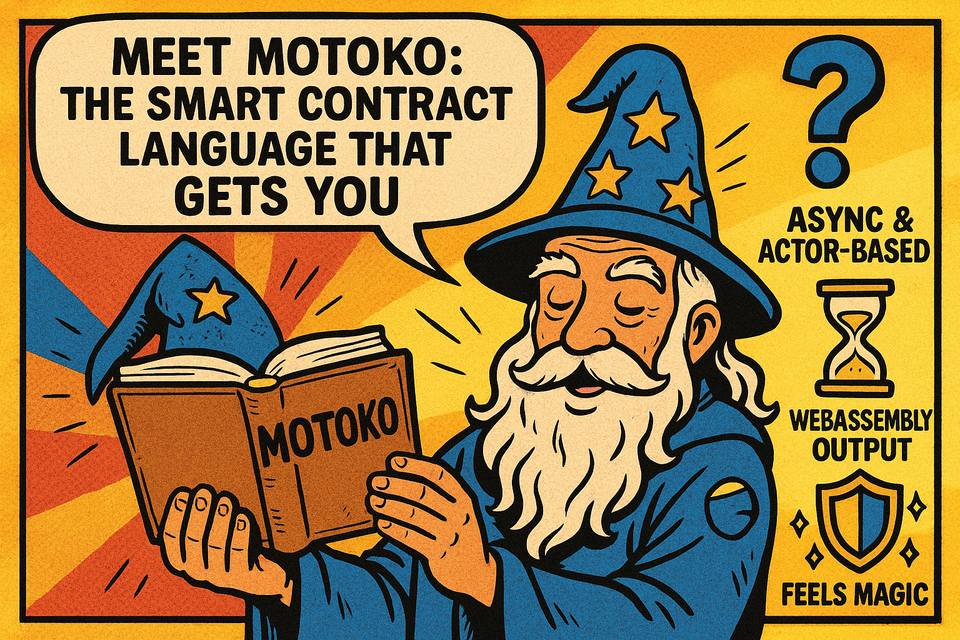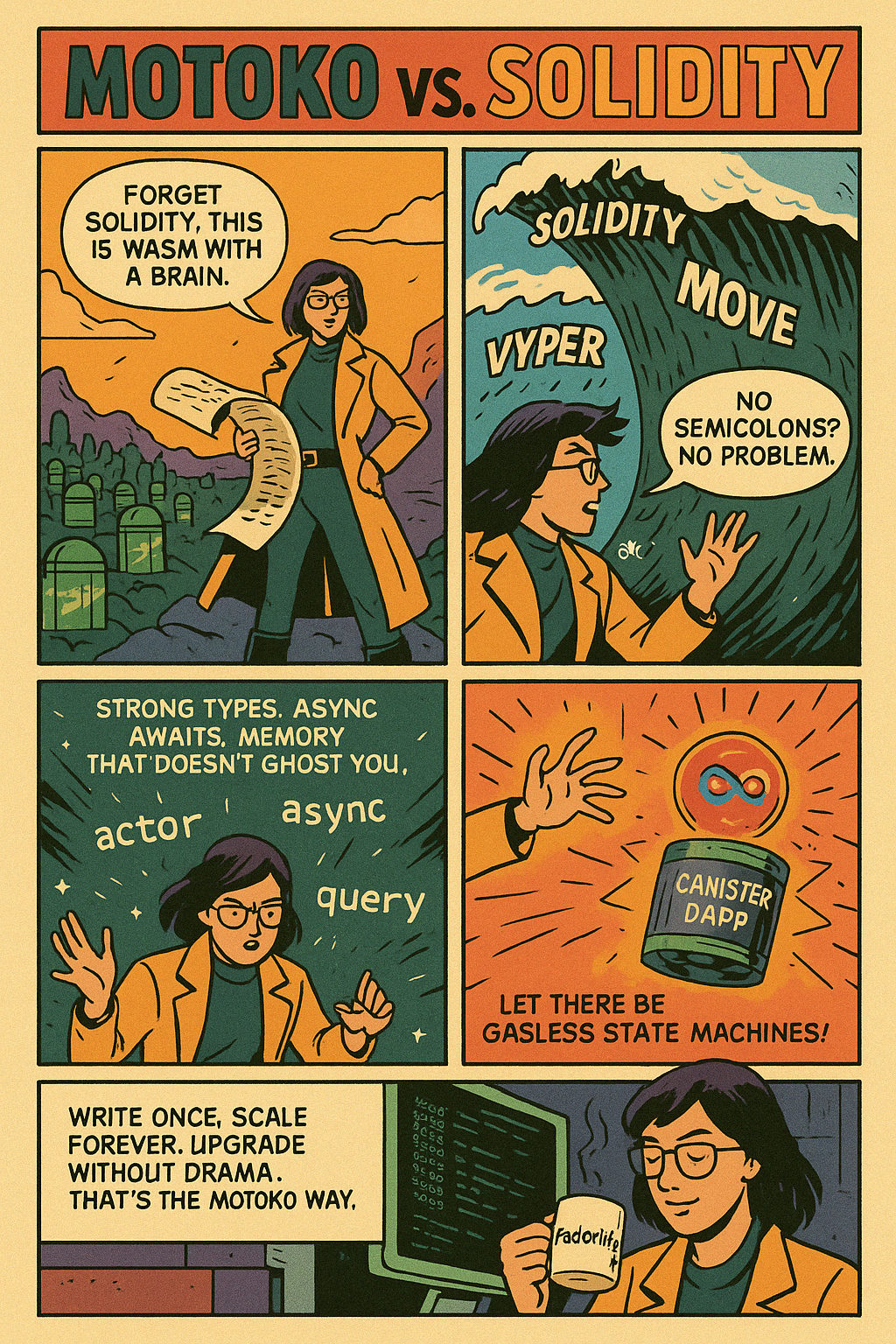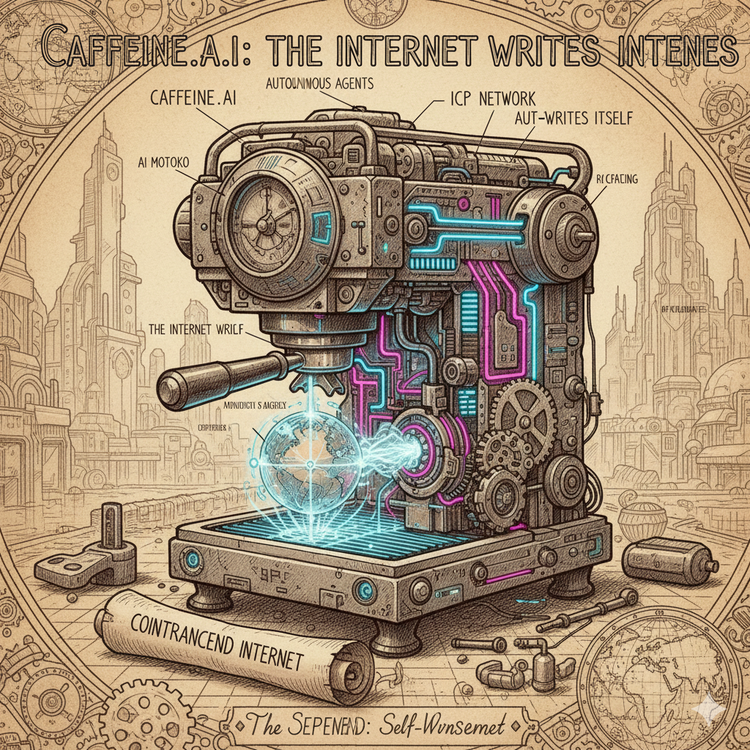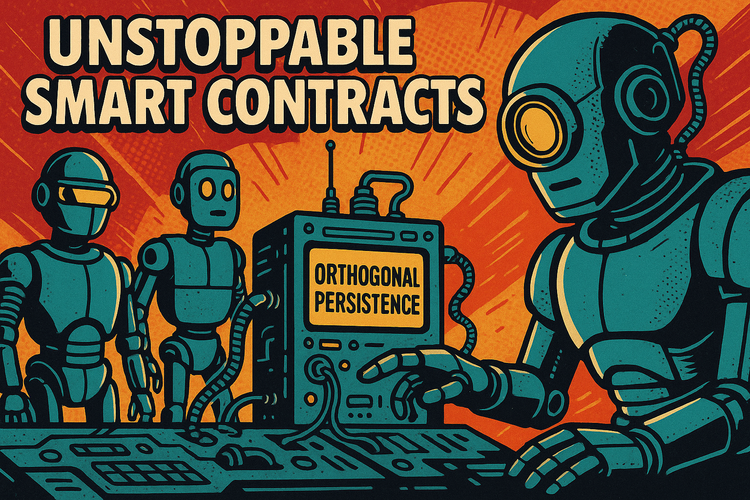Meet Motoko: The Smart Contract Language That Gets You

Once upon a REPL, most smart contract languages felt like they were written by compilers for compilers. Then came Motoko — designed by DFINITY to run natively on the Internet Computer (ICP), and to spare developers the heartbreak of Solidity-style bugs, gas headaches, and boilerplate burnout.
Let’s be real: Motoko isn’t just a programming language. It’s a whole vibe.
Write once. Scale forever. Upgrade without drama. That’s the Motoko way.
🧐 So, What Is Motoko?
Motoko is the native language for writing canister smart contracts on ICP. It's actor-based, async-first, and was built from scratch with blockchain weirdness already in mind. Instead of bolting features onto some legacy language, Motoko embraced:
- ✨ Orthogonal persistence (no need to shove state into a DB)
- ⌛ Async/await that makes inter-canister calls readable
- 🏢 Actor model with encapsulated state, like objects that live forever (and might vote)
- 🪀 WebAssembly output that runs natively on-chain
And yeah, it compiles down to Wasm, just like Rust, TypeScript, and your cousin’s rogue Lisp dialect. But Motoko feels different: built-in safety, structural types, expressive syntax, and none of that JavaScript shrug-emoji null-pointer stuff.
🧪 Motoko vs Solidity: The Web3 Language Face-Off
| Feature | 🧠 Motoko (ICP) | 🧨 Solidity (Ethereum) |
|---|---|---|
| Platform | Internet Computer Protocol (ICP) | Ethereum + EVM-compatible chains |
| Syntax Style | Clean, inspired by JS/ML with async sugar | JS-like, but with quirks and footguns |
| Typing | Strongly typed, structural types, pattern matching | Dynamically-ish typed, with unsafe casting |
| Null Safety | No implicit nulls—uses option types | null, undefined, and the lurking void 😬 |
| Smart Contract Model | Actor-based, autonomous, communicates via async messages | Contract-based with external function modifiers |
| Persistence | Orthogonal persistence—state survives upgrades out of the box | Manual state migration—bring your own serialization |
| Async Handling | Native async/await, futures for inter-canister calls | No native async—just call other contracts and hope |
| Gas Model | Prepaid cycles, super cheap, no global fee market | Gas required for every tx; market-based and often painful |
| Security | Checked arithmetic, no inheritance, no unsafe casting | Known reentrancy and overflow pitfalls unless manually avoided |
| Compiler Warnings | Verbose and helpful; yells when you mess up (nicely) | Variable—some errors sneak through, others spam the console |
| Upgrade Safety | Stable variables, explicit migrations supported natively | Devs often write entire frameworks just to not lose data |
| Dev Experience | Great for building large, composable systems on ICP | Excellent tooling ecosystem, but safety requires discipline |
| Tooling & Ecosystem | Growing steadily, backed by DFINITY and open source | Massive, battle-tested, mature |
| Best Use Case | Secure, upgradeable, full-stack dapps with native BTC/AI access | DeFi protocols, NFT drops, anything that EVM eats for breakfast |
| Can Compile to WebAssembly? | Yes, natively | Not natively (compiles to EVM bytecode) |
| Learning Curve | Moderate—great for JS/Rust devs who value sanity | Easy to start, hard to master (and easy to mess up in between) |
🚀 New in Motoko v0.14.6: Safety Gets Even Safer
Just dropped: Motoko v0.14.6, and it's here to stop devs from accidentally nuking their state during upgrades. Here's what's new:
- ❌ No more silent data loss: You can't drop a stable variable or promote its type to a lossy supertype without explicitly migrating it. If you try, Motoko will stop you like a type-safe bouncer.
- ⚠️ Warnings for inaccessible fields: If you define fields in records or objects that your type constraints can’t reach, Motoko will now politely yell at you.
- 🛠️ Expanded platform support: Artifacts now available for Darwin-arm64 and Linux-aarch64. Apple Silicon devs, rejoice.
This release is like Motoko telling developers: “I love you. But I'm not letting you break things unless you really mean to.”
💳 Why Use Motoko?
Sure, you could write your ICP canisters in Rust or JS. But Motoko is purpose-built:
- ✨ Cleaner syntax for smart contracts
- 🧰 Strong typing, modern pattern matching, no
nulllandmines - 🏛️ Seamless upgrades with stable variables
- ⚖️ Compiler-verified interfaces via Candid (IDL for the win)
Motoko isn’t trying to be the one language to rule them all. It’s trying to be the best language for ICP — and if that makes it niche? Cool. It’s a niche with great type inference.

🚜 What You Can Build
- A DeFi canister with persistent state and no need for external databases.
- A DAO that upgrades itself and keeps its voting history alive.
- An AI-agent backend that speaks directly to ckBTC.
- Or just a "Hello, world!" that responds in <2s, from a blockchain. Because you can.
actor Main {
public query func hello() : async Text {
"Hello, world!"
};
};
🚫 No More "Oops My Upgrade Erased Everything"
Motoko's approach to orthogonal persistence means state is preserved between upgrades. And with features like stable var, you don’t need to serialize your data to a string and pray.
Now in v0.14.6, even removing a stable field without a migration will throw a warning. That’s the language saying: “Hey, I see what you're doing. Are you sure?”
📲 Who Should Try Motoko?
- JS devs tired of duck typing
- Rust devs tired of borrowing everything
- Blockchain devs tired of writing state machines with duct tape
If you can write JavaScript, you can probably learn Motoko. And if you’ve ever debugged a Solidity contract, you might cry tears of joy here.
🔧 Want to Try It?
🕵️♂️ TL;DR:
Motoko is the actor-based, async-loving, safety-first language for building on ICP. It’s not trying to win language wars—it’s trying to help you ship upgradeable, reliable smart contracts without needing a PhD in blockchain edge cases.
Stay Notoko. Stay strongly typed.
💡 Subscribe to Notoko Bytes for more crypto chaos straight to your inbox! 🚀

Want to feature your brand on Notoko Bytes? 🚀 Contact us at ctrascend@gmail.com for sponsored posts!
Disclaimer
*The information and analysis provided in this article are intended for educational and informational purposes only and should not be considered as financial, investment, or professional advice. While our team strives to ensure the accuracy and reliability of the content, we make no representations or warranties of any kind, express or implied, about the completeness, accuracy, reliability, suitability, or availability of the information presented.
The content within this article may include opinions and forward-looking statements that involve risks and uncertainties. The blockchain and cryptocurrency markets are highly volatile, and past performance is not indicative of future results. Any reliance you place on the information presented is strictly at your own risk. Before making any investment decisions, we highly recommend consulting with a qualified financial advisor or conducting your own thorough research.
By accessing and using the information provided in this article, you acknowledge and agree that neither the authors, publishers, nor any other party involved in the creation or delivery of the content shall be held liable for any direct, indirect, incidental, consequential, or punitive damages, including but not limited to loss of profits, goodwill, or data, arising out of your use or inability to use the information provided or any actions you take based on the information contained within this section.*





